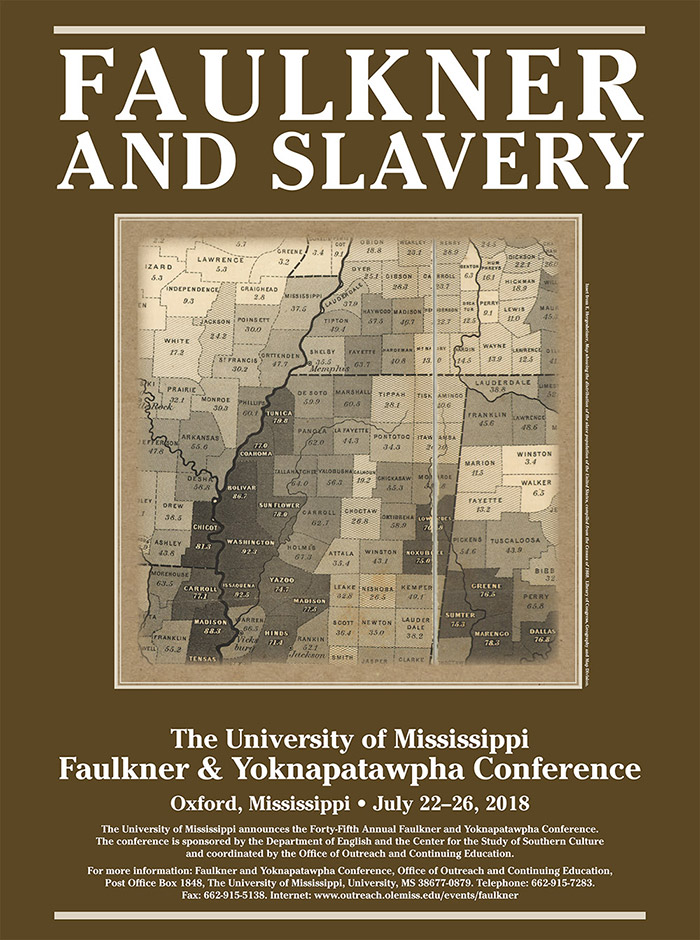
Panel. "Distensions" and Extensions: Beyond the Popular Icons of Slavery
Location
Nutt Auditorium
Start Date
25-7-2018 3:30 PM
Description
- Slavery’s Temporalities / Peter Lurie, University of Richmond
In their accounts of slavery, certain Faulkner works share with film accounts of enslavement a particular emphasis on time. As slave narratives declare, time for the enslaved does not exist, per se, or it registered as an undifferentiated, homogenous state of non-being. Similarly, historiography of the slave trade outlines the varied temporal contours of enslavement for the African captive and the European trader. This paper uses theories of narrative temporality (e.g. Bahktin’s chronotope) to argue for a temporal singularity manifest in Faulkner’s stylistic and thematic uniqueness, one that is shared by films that engage slavery’s legacy both overtly and through a salutary, haunted indirection. The Faulkerian long sentence finds a meaningful analogue in the cinematic long take in films by Steve McQueen and Charles Burnett, each of which suggest the temporal distention Gilles Deleuze describes in The Time-Image as well as a palpable temporal “fetter,” one prompted by an engagement with the deep time of history and the slave state. - Signs and Wonders, Yoruba in Yoknapatawpha: Subverting Slavery / Chuck Peek, University of Nebraska, Kearney
This paper explores the focus of recent scholarship on "nation-building/ethnic identity"--a focus on the cultural ritual of the 'ring shout' that survived the Middle Passage and Auction Block to tie slave communities with their African past, continuing even after slavery itself ended and providing survival to African Americans during the subsequent 'slavery by other means' that threatened to de-center the community. The origins and outlines of features of this ritual suggest direct ties to elements in Faulkner stories that are often 'under-read' and suggest Faulkner's awareness of the "spiritual" means by which slaves and former slaves survived. - “Money Aint Got But One Language”: Wage Slavery in Faulkner’s Fiction / Theresa Towner, University of Texas, Dallas
This paper will extend the conference theme to include postbellum wage slaves, those who, like George Orwell’s plongeurs, depend on unscrupulous employers to make good on promised wages in order to keep body and soul together. The work they do might be deemed necessary to society and “honest,” but it might not be; regardless, it is certainly conducted to advance the various interests of the employer by turning the worker into a cog. The paper will focus on “Fox Hunt,” “Pennsylvania Station,” and If I Forget Thee, Jerusalem/The Wild Palms because the bodyguard, Margaret Gihon, and the workers at the mine in Utah are all obvious wage slaves whose plights in turn reflect the main characters’ involvement with larger, potentially enslaving cultural realities—marriage, parenthood, and employment itself, including the work of the self-employed professional writer. - Response / Sarah Gleeson-White, University of Sydney
Relational Format
Conference proceeding
Recommended Citation
Lurie, Peter; Peek, Charles A.; Towner, Theresa M.; and Gleeson-White, Sarah, "Panel. "Distensions" and Extensions: Beyond the Popular Icons of Slavery" (2018). Faulkner and Yoknapatawpha Conference. 27.
https://egrove.olemiss.edu/fy/2018/schedule/27
COinS
Jul 25th, 3:30 PM
Panel. "Distensions" and Extensions: Beyond the Popular Icons of Slavery
Nutt Auditorium
- Slavery’s Temporalities / Peter Lurie, University of Richmond
In their accounts of slavery, certain Faulkner works share with film accounts of enslavement a particular emphasis on time. As slave narratives declare, time for the enslaved does not exist, per se, or it registered as an undifferentiated, homogenous state of non-being. Similarly, historiography of the slave trade outlines the varied temporal contours of enslavement for the African captive and the European trader. This paper uses theories of narrative temporality (e.g. Bahktin’s chronotope) to argue for a temporal singularity manifest in Faulkner’s stylistic and thematic uniqueness, one that is shared by films that engage slavery’s legacy both overtly and through a salutary, haunted indirection. The Faulkerian long sentence finds a meaningful analogue in the cinematic long take in films by Steve McQueen and Charles Burnett, each of which suggest the temporal distention Gilles Deleuze describes in The Time-Image as well as a palpable temporal “fetter,” one prompted by an engagement with the deep time of history and the slave state. - Signs and Wonders, Yoruba in Yoknapatawpha: Subverting Slavery / Chuck Peek, University of Nebraska, Kearney
This paper explores the focus of recent scholarship on "nation-building/ethnic identity"--a focus on the cultural ritual of the 'ring shout' that survived the Middle Passage and Auction Block to tie slave communities with their African past, continuing even after slavery itself ended and providing survival to African Americans during the subsequent 'slavery by other means' that threatened to de-center the community. The origins and outlines of features of this ritual suggest direct ties to elements in Faulkner stories that are often 'under-read' and suggest Faulkner's awareness of the "spiritual" means by which slaves and former slaves survived. - “Money Aint Got But One Language”: Wage Slavery in Faulkner’s Fiction / Theresa Towner, University of Texas, Dallas
This paper will extend the conference theme to include postbellum wage slaves, those who, like George Orwell’s plongeurs, depend on unscrupulous employers to make good on promised wages in order to keep body and soul together. The work they do might be deemed necessary to society and “honest,” but it might not be; regardless, it is certainly conducted to advance the various interests of the employer by turning the worker into a cog. The paper will focus on “Fox Hunt,” “Pennsylvania Station,” and If I Forget Thee, Jerusalem/The Wild Palms because the bodyguard, Margaret Gihon, and the workers at the mine in Utah are all obvious wage slaves whose plights in turn reflect the main characters’ involvement with larger, potentially enslaving cultural realities—marriage, parenthood, and employment itself, including the work of the self-employed professional writer. - Response / Sarah Gleeson-White, University of Sydney

